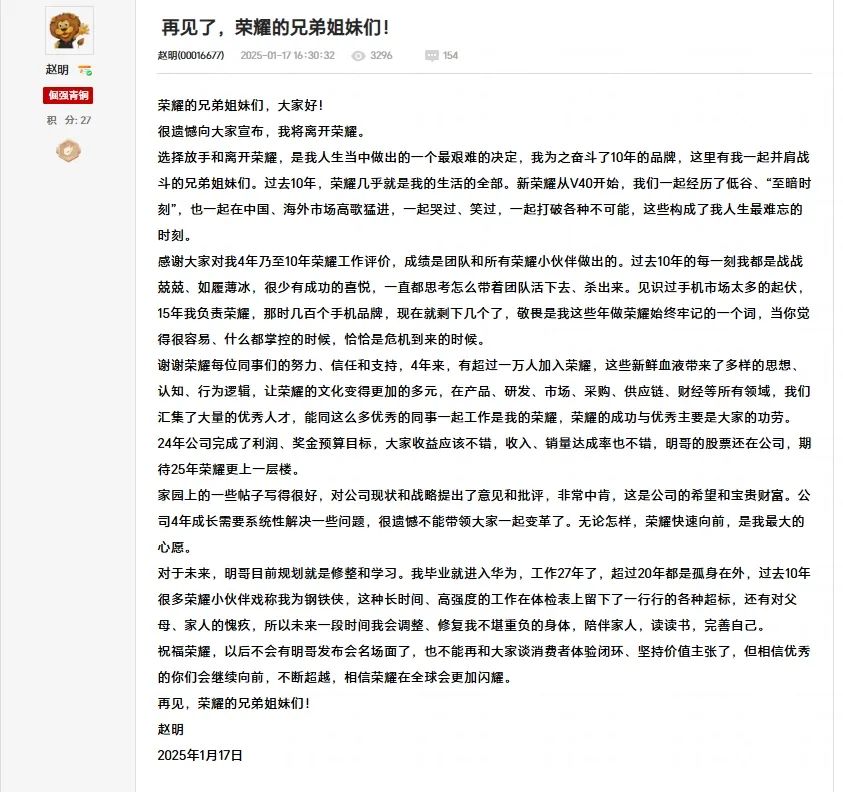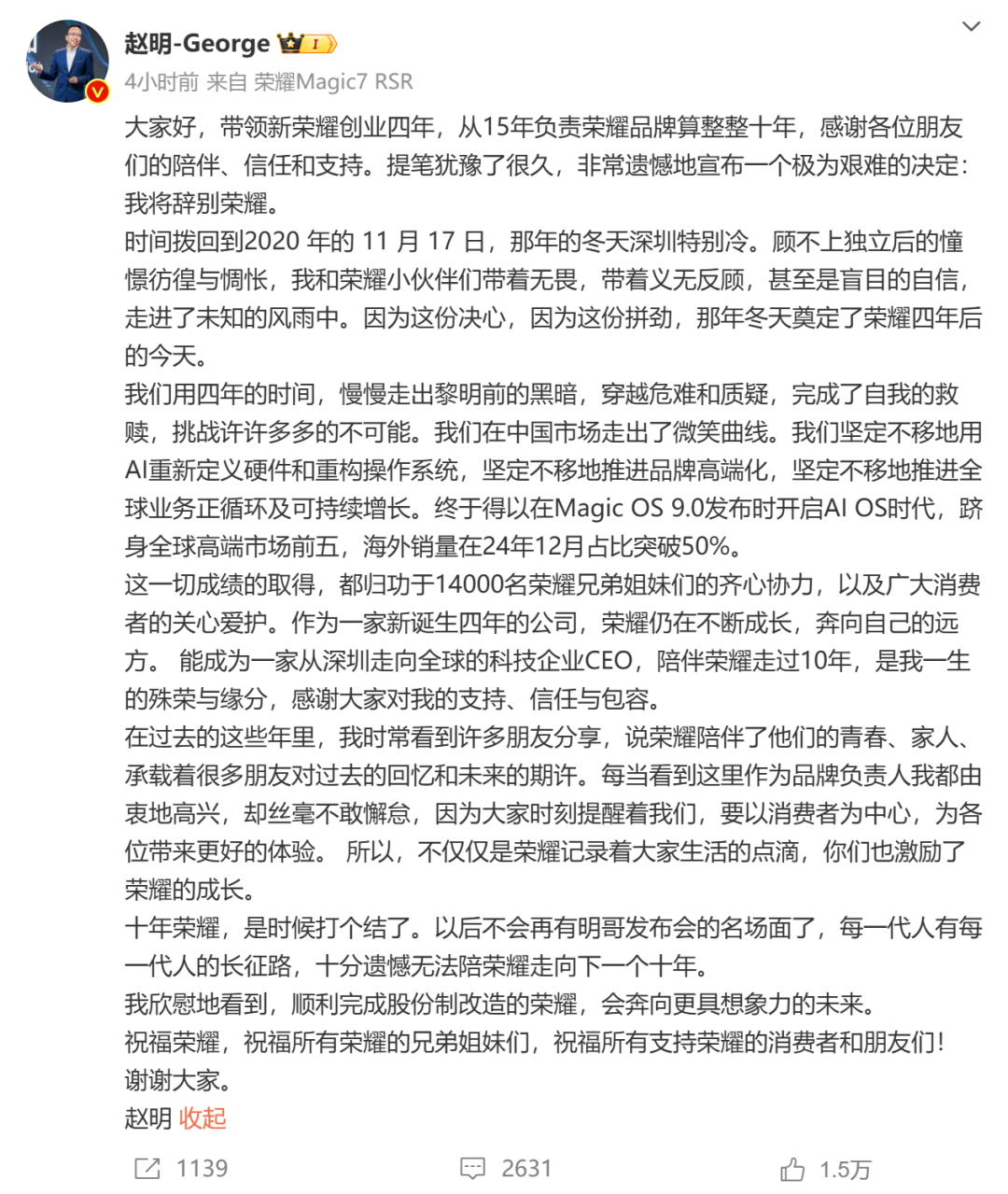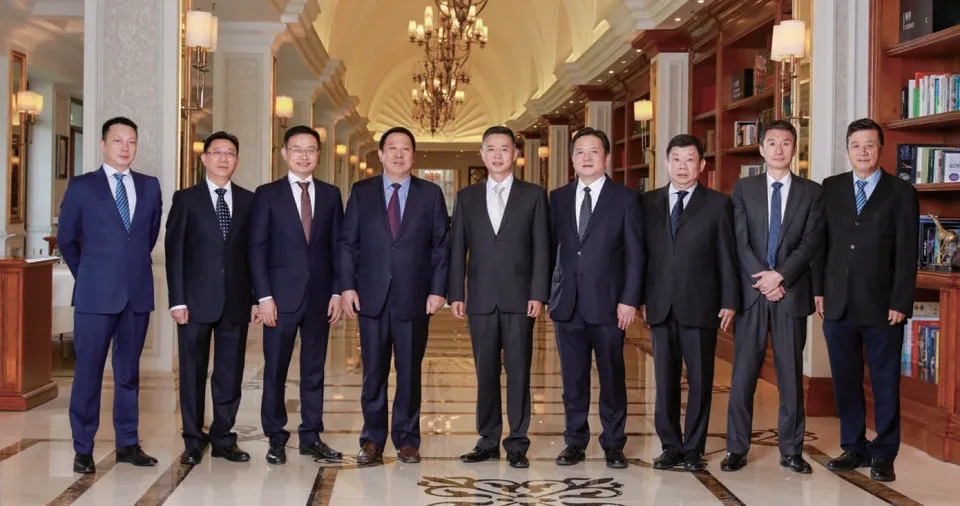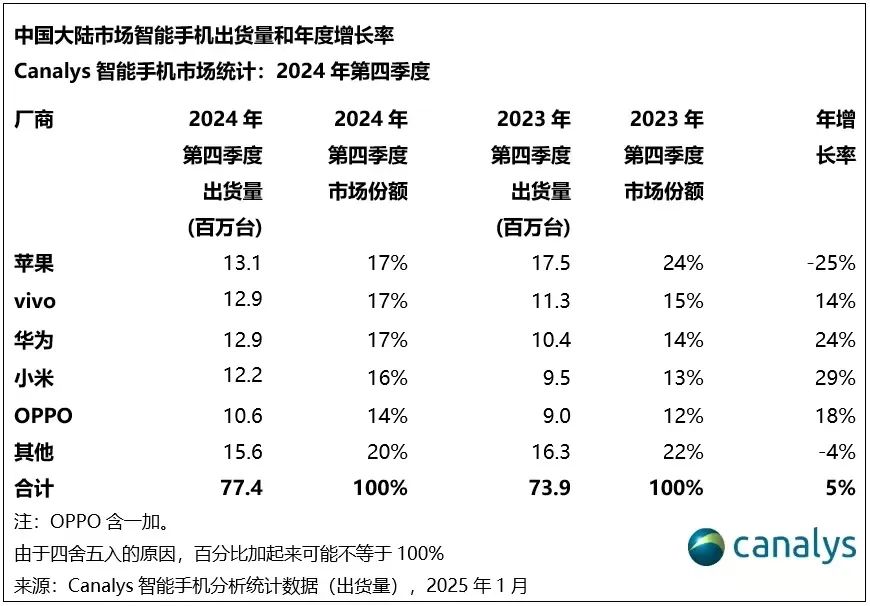After Five Years of Independence, Honor's CEO Steps Down
![]() 01/23 2025
01/23 2025
![]() 474
474
Following multiple official denials, Honor has finally confirmed that Zhao Ming has resigned from his position as CEO and related roles due to personal reasons, with Li Jian, a former Huawei executive, set to take over.
This development is unusual on several fronts.
Firstly, Zhao Ming's qualifications are impressive. Joining Huawei in 1998, he became the president of Honor in 2015 and assumed the role of CEO of Honor Terminal Co., Ltd. following Honor's independence in 2020, guiding the company ever since.
Secondly, the timing is curious. Since its independence, Honor has been actively pursuing its IPO. In late December of last year, the company successfully completed its shareholding reform, bringing it closer to its goal of going public. However, Zhao Ming's sudden resignation, less than a month after this reform, is both unexpected and perplexing given his contributions.
Under Zhao Ming's leadership, pre-independence Honor rose from obscurity to become China's top 2 Internet mobile phone brand, expanding into laptops, tablets, and smart wearables. Post-independence, he led the company in reorganizing its team and securing market share left by Huawei mobile phones, achieving notable success despite pandemic challenges and a shrinking market.

Image source: Honor Mobile Weibo
Despite some shortcomings, Zhao Ming's nearly decade-long tenure as a senior executive at Honor can be described as diligent and fruitful.
With Mingge's departure, the question arises: can Li Jian carry on the Honor banner and continue advancing the IPO path? Can Honor find a path to sustained growth in an increasingly competitive market?
01
A Difficult Decision
Shortly after his resignation was announced, Zhao Ming published a heartfelt farewell letter on Honor's internal network and social media platforms.
In the internal letter, he candidly admitted that leaving Honor was the "toughest decision" he had ever made, describing the past decade as "filled with trepidation and walking on thin ice." Even as he departs, he retains company stocks.
Regarding his resignation, he cited "long hours and high-intensity work" taking a toll on his health, stating his intention to rest, study, spend time with family, read, and improve himself.
He also expressed optimism about Honor's achievements in 2024, meeting its profit and bonus budget targets, and looked forward to the company shining globally.

Image source: Internet
In his open letter on social media, Zhao Ming highlighted Honor's achievements since independence: initiating the AI OS era, ranking among the top five in the global high-end market, and overseas sales accounting for over 50% in December 2024. He emphasized that with its shareholding reform completed, Honor is poised for a future filled with imagination.
Zhao Ming's resume follows a typical path of Huawei executives. After graduating with a master's degree from Shanghai Jiao Tong University in 1998, he joined Huawei as an ordinary algorithm R&D engineer, rising through the ranks to become president of Huawei Honor in 2015, helping it become China's top Internet mobile phone brand.
Following Honor's independence in 2020, Zhao Ming was appointed CEO of Honor Terminal Co., Ltd., effectively promoting brand and product premiumization, taking over Huawei's domestic market share, and becoming a top-selling mobile phone brand.

Image source: Zhao Ming's Weibo
Meanwhile, Honor continued to make strides in AI OS and overseas markets, with Zhao Ming demonstrating Honor's AI capabilities by instantly ordering 2,000 cups of Luckin Coffee. Last month, Honor achieved a 50-50 split in sales between China and overseas markets.
With Honor on the cusp of its IPO, Zhao Ming's departure seems all the more inexplicable.
02
Frequent Executive Turnover
In recent years, Honor has seen frequent changes among its senior executives.
Concurrent with Zhao Ming's resignation, Wang Ban, the former president of the China region, was transferred to serve as vice president of overseas and platform businesses, with Ni Jiayue, previously president of Honor's all-scenario business department, taking over as the new China region president.
In November 2023, amid rumors that Honor needed to go public within three years of its independence, Wan Biao stepped down as chairman of Honor Terminal Co., Ltd., taking on the role of vice chairman. The new chairman is Wu Hui, previously chairman of Shenzhen Water Group Co., Ltd., a move seen as reflecting the shareholder Shenzhen's state-owned assets' will to promote Honor's IPO.
Wan Biao, who had served in various senior roles at Huawei, including president of the wireless product line and the terminal company, became chairman of Honor Terminal Co., Ltd. upon the company's independence in 2020.
In August 2024, Honor announced plans to initiate shareholding reform in the fourth quarter and subsequently pursue the IPO process. However, in September 2024, Wan Biao resigned from his position due to personal reasons.
The frequent changes among Honor's senior executives, occurring on the eve of its shareholding reform and IPO, suggest possible capital struggles behind the scenes.

Image source: Qichacha
After a nearly two-year financing gap, Honor introduced two rounds of strategic financing in August and October 2024, including new shareholders like China Mobile, China Telecom, China Reform Holdings Corporation, and CICC Capital. According to Qichacha data, Honor now has 23 shareholders, including local state-owned assets, suppliers, and third-party capital, with state-owned shareholders holding a majority stake.
Given that Shenzhen's state-owned asset-controlled Shenzhen Smart City Technology Development Group jointly established a new company with over 30 Honor agents and distributors upon Honor's independence in 2020, it's understandable that capital struggles behind the scenes have led to changes among senior executives as more shareholders join to promote the IPO process.
So, where will the new helmsman lead Honor?
03
A Fellow Huawei Veteran
Taking over Zhao Ming's position is Li Jian, three years younger and considered Zhao Ming's "younger brother."
Li Jian graduated with a master's degree from Xidian University and joined Huawei in 2001, holding various positions such as representative of the Nigeria and Ghana representative offices, president of the West Africa regional department, special assistant to the president of the sales and service system, and president of the customer group and regional business support department, among others. As early as 2016, he appeared on Huawei's Supervisory Board list.

Li Jian on the left, Image source: "Huawei Investment Holding Co., Ltd. 2020 Annual Report"
In 2017, Huawei's Xinsheng Community official Weibo introduced Li Jian, noting his perseverance as a product manager in Nigeria, where he once waited outside a client's president's door for over three hours and even blocked him at the bathroom door. His dedication led to signing contracts worth over $30 million in three months, nearly $200 million in the first year, and over $400 million in the third year, making the Nigeria representative office's sales performance rank first globally for four consecutive years.
In 2021, Li Jian joined post-independence Honor, serving as a core member of the management team, vice chairman, director, and president of the human resources department.
With his track record of achieving top performance and extensive experience in products, sales, and human resources, Li Jian is expected to lead Honor to further benign development post-shareholding reform and promote the IPO process.
04
Hidden Concerns for Honor
A year ago, in "Brand Premiumization, AI Empowerment, and Going Overseas: Can They Support Honor's Capital Story?" Heibantab summarized Honor's IPO narrative: brand premiumization, AI empowerment, and overseas markets.
A year later, as shareholding reform progresses, Honor's IPO story seems somewhat dimmer.
According to Wallstreetcn reports, Honor planned to submit materials for a ChiNext board IPO application in 2024, with a pre-IPO valuation of RMB 200 billion. However, Caixin reports suggest that when Shenzhen's state-owned assets and other shareholders jointly acquired Honor, the transaction price may have been as high as approximately $40 billion (approximately RMB 260 billion, based on the exchange rate at that time).
In other words, after four years, Honor's valuation has shrunk by nearly 23%.
This is understandable given the changing market dynamics.
In the mobile phone market, with Huawei's high-profile return, Honor is no longer the sole focus. According to Canalys data, Honor ranked first in China's smartphone market shipments with 20% and 18% market shares in Q1 2022 and Q3 2023, respectively. However, in Q1 2024, Huawei returned to the top with a 17% market share, while Honor ranked third with 16%, falling out of the top five in Q4 2024.
Overseas, despite Zhao Ming's announcement that Honor's overseas sales accounted for 50% in December 2024, the top five in Canalys' 2024 Q4 shipment rankings were Apple, Samsung, Xiaomi, Transsion, and vivo, with no mention of Honor.

Image source: Canalys
Regarding Honor's premiumization efforts, Canalys data shows that in Q3 2024, Apple and Huawei accounted for 52% and 33%, respectively, of China's mobile phone market share in the price segment above $600, with Honor ranking third at only 5%.
Post-independence, Honor leveraged its dealer network and Huawei's vacancy to achieve unprecedented success. However, with Huawei's return, many Honor models were criticized for design similarities, and its high-profile promotion of AI OS has not significantly attracted consumers based on market performance.
More troublingly, four years after its independence, Honor still relies heavily on mobile phones as its core business. An IPO requires a compelling narrative, and besides AI, which is not markedly different from competitors, Honor has little to offer in terms of embodied intelligence, new energy vehicles, or even somewhat outdated concepts like smart homes and the metaverse.
It's worth noting that when Xiaomi went public six years ago, Lei Jun positioned it as an "Internet company" rather than a "mobile phone company."
Six years later, what will be the outcome of Honor's IPO? Zhao Ming has waved goodbye, and now it's up to Li Jian to steer the ship.








